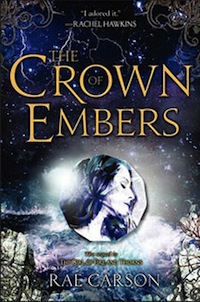Point of view, when it's targeted correctly, when the author is truly immersed in the voice and character on the page, can create vivid, emotional pictures like this:
The Quorum chamber is low ceilinged and windowless, like a tomb. Candles flicker from sconces set in dusty mortar between gray stones. A squat oak table fills the center, surrounded by red cushions. The air is thick with unyielding silence, and I feel as though the ghosts of weighty decisions and secret councils press in around me, telling me to hush.Rae Carson, in The Crown of Embers, pulls on her main character's skin to conjure up this slice of perspective on a room in the palace. The room feels oppressive, suffocating, not because it actually IS that way, but because of the perspective and the emotional baggage that the main character carries with her when she crosses the threshold. You can feel her dread and at the same time her need to prove herself, to break free of those who want to use her insecurity to control her.
You'll notice that Carson is writing in first person, a popular method of storytelling in YA fantasy and dystopia these days. First person perspective highlights the advantages of effective point of view in narrative. Using a first person perspective limits your options. You really can't slip into a minor character's perspective or cheat and give the reader details that your main character would never know, wouldn't care about, or wouldn't notice. You ARE your main character. You see what she sees. You tell us what she feels in the moment, and the effect is that the reader is drawn deeply into the scene and into a relationship with the main character.
The thing that's REALLY hard to wrap your head around is that, in order to truly find your story's voice, you have to do those things no matter which POV you choose. Even in third person you can (and should) put on your character's skin and dip into her emotions, using her past and present experiences to illuminate the scene before you. That is what makes inspired writing.
And now for the obligatory example from the pages of Harry Potter and the Order of the Phoenix:
Harry dropped his gaze to the chair in the center of the room, the arms of which were covered in chains. He had seen those chains spring to life and bind whoever sat between them. His footsteps echoed loudly as he walked across the stone floor. When he sat gingerly on the edge of the chair the chains clinked rather threateningly but did not bind him. Feeling rather sick he looked up at the people seated at the bench above.J.K. Rowling taps into Harry's memories and emotions to paint a picture of the witness stand in the Wizengamot that chills the bravest, most defiant spirit. You can feel Harry's anxiety, his powerlessness in the moment. He is at the mercy of people and powers that are at best disinterested, and at worst invested in his destruction. She doesn't have to tell us these things for us to figure them out. We read it in what Harry notices, what he remembers, and how he reacts to his environment and to the other characters in the scene.
The third person POV advantage is that you can occasionally slip into other characters' heads and write from their perspective as well. But you have to be choosy. Really examine why you need that character's perspective to paint your picture. If you can't come up with a compelling reason for using a character's perspective, stick to your main character. Otherwise you risk diluting the narrative and losing your reader in the process.
If you're having trouble with this, if you find that you keep straying from your main character's point of view into other character's heads, maybe it's time to re-evaluate the story, up the stakes to refocus your narrative and your main character's goals, or decide if your main character is really your main character. It's possible that the story belongs to someone you thought was in the background. Stranger things have happened.


